Analyzing Cross-Cultural Training Programs for Australian Expatriates
VerifiedAdded on 2023/06/10
|10
|3208
|133
Essay
AI Summary
This research essay investigates the significance of cross-cultural training for Australian expatriates operating in diverse international contexts. The study explores the concept of cross-cultural training, emphasizing its critical role in global business, and analyzes various training methodologies, including experiential, language, and cultural awareness training. The essay highlights the benefits of these training programs, such as improved interpersonal skills, enhanced adaptability, and the development of cultural sensitivity, ultimately leading to increased efficiency and success in international assignments. The discussion underscores the importance of these programs for businesses, emphasizing the need for effective strategies to support expatriates and foster a culturally diverse and inclusive work environment. The essay also provides recommendations for business managers to implement effective cross-cultural training programs to ensure successful international assignments and business growth.

RESEARCH ESSAY
Paraphrase This Document
Need a fresh take? Get an instant paraphrase of this document with our AI Paraphraser
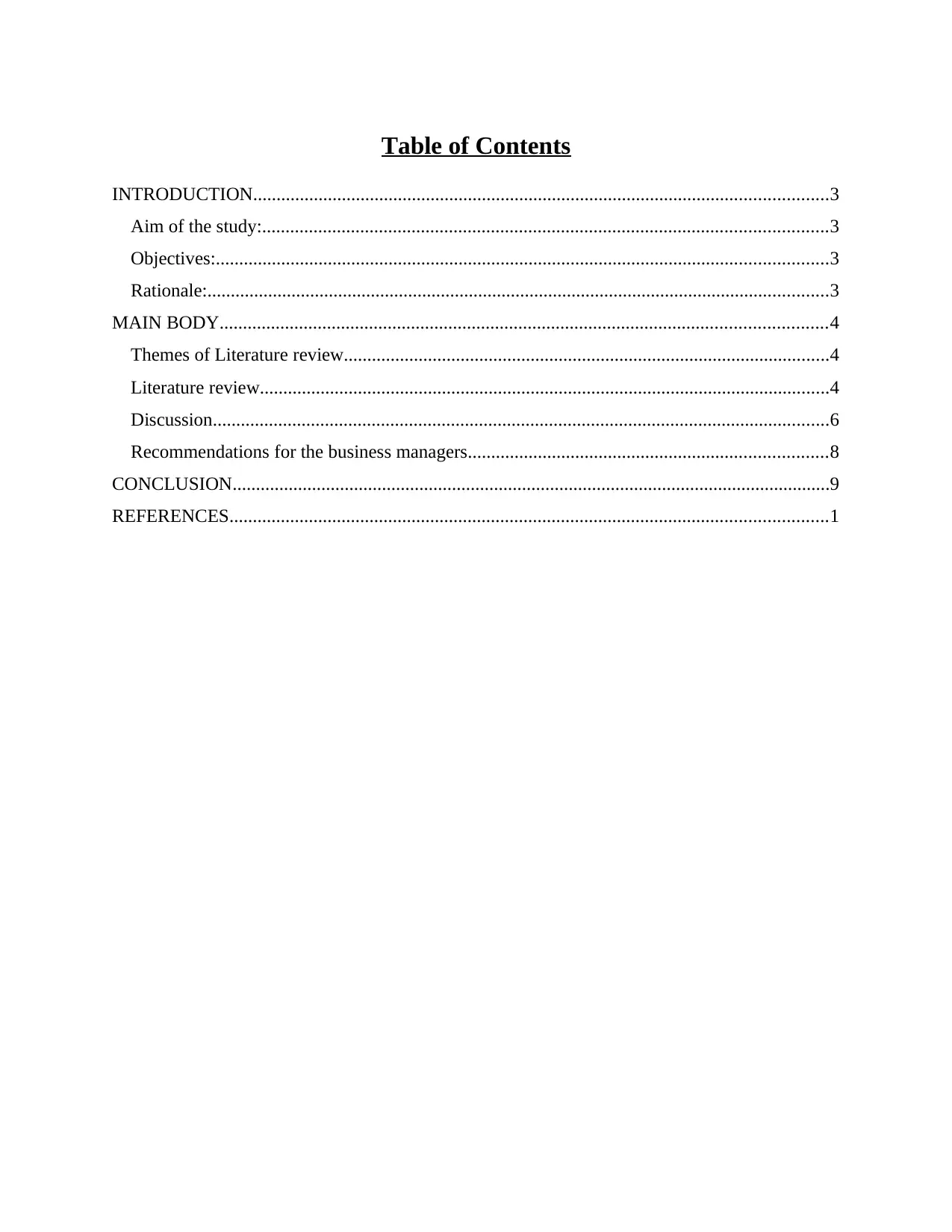
Table of Contents
INTRODUCTION...........................................................................................................................3
Aim of the study:.........................................................................................................................3
Objectives:...................................................................................................................................3
Rationale:.....................................................................................................................................3
MAIN BODY..................................................................................................................................4
Themes of Literature review........................................................................................................4
Literature review..........................................................................................................................4
Discussion....................................................................................................................................6
Recommendations for the business managers.............................................................................8
CONCLUSION................................................................................................................................9
REFERENCES................................................................................................................................1
INTRODUCTION...........................................................................................................................3
Aim of the study:.........................................................................................................................3
Objectives:...................................................................................................................................3
Rationale:.....................................................................................................................................3
MAIN BODY..................................................................................................................................4
Themes of Literature review........................................................................................................4
Literature review..........................................................................................................................4
Discussion....................................................................................................................................6
Recommendations for the business managers.............................................................................8
CONCLUSION................................................................................................................................9
REFERENCES................................................................................................................................1
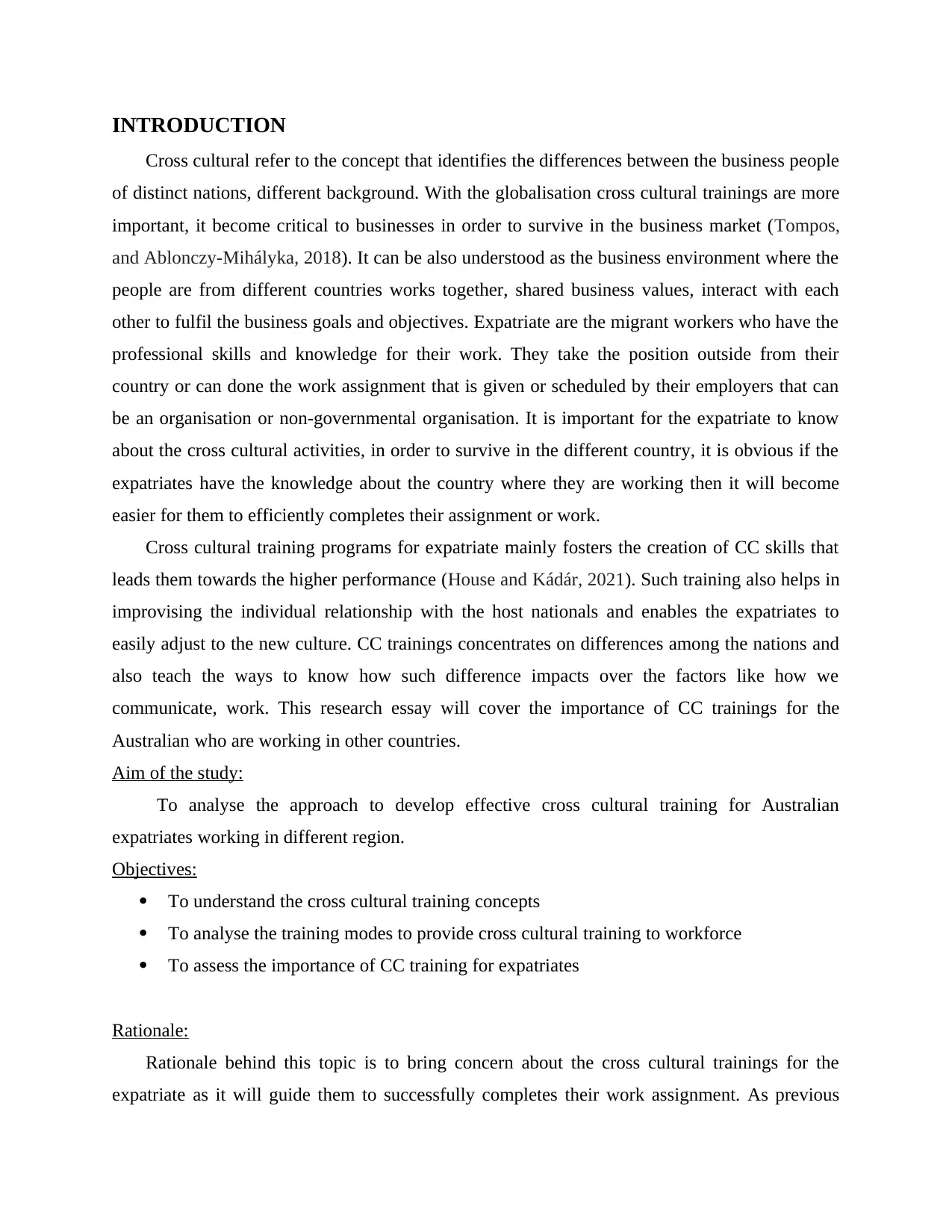
INTRODUCTION
Cross cultural refer to the concept that identifies the differences between the business people
of distinct nations, different background. With the globalisation cross cultural trainings are more
important, it become critical to businesses in order to survive in the business market (Tompos,
and Ablonczy-Mihályka, 2018). It can be also understood as the business environment where the
people are from different countries works together, shared business values, interact with each
other to fulfil the business goals and objectives. Expatriate are the migrant workers who have the
professional skills and knowledge for their work. They take the position outside from their
country or can done the work assignment that is given or scheduled by their employers that can
be an organisation or non-governmental organisation. It is important for the expatriate to know
about the cross cultural activities, in order to survive in the different country, it is obvious if the
expatriates have the knowledge about the country where they are working then it will become
easier for them to efficiently completes their assignment or work.
Cross cultural training programs for expatriate mainly fosters the creation of CC skills that
leads them towards the higher performance (House and Kádár, 2021). Such training also helps in
improvising the individual relationship with the host nationals and enables the expatriates to
easily adjust to the new culture. CC trainings concentrates on differences among the nations and
also teach the ways to know how such difference impacts over the factors like how we
communicate, work. This research essay will cover the importance of CC trainings for the
Australian who are working in other countries.
Aim of the study:
To analyse the approach to develop effective cross cultural training for Australian
expatriates working in different region.
Objectives:
To understand the cross cultural training concepts
To analyse the training modes to provide cross cultural training to workforce
To assess the importance of CC training for expatriates
Rationale:
Rationale behind this topic is to bring concern about the cross cultural trainings for the
expatriate as it will guide them to successfully completes their work assignment. As previous
Cross cultural refer to the concept that identifies the differences between the business people
of distinct nations, different background. With the globalisation cross cultural trainings are more
important, it become critical to businesses in order to survive in the business market (Tompos,
and Ablonczy-Mihályka, 2018). It can be also understood as the business environment where the
people are from different countries works together, shared business values, interact with each
other to fulfil the business goals and objectives. Expatriate are the migrant workers who have the
professional skills and knowledge for their work. They take the position outside from their
country or can done the work assignment that is given or scheduled by their employers that can
be an organisation or non-governmental organisation. It is important for the expatriate to know
about the cross cultural activities, in order to survive in the different country, it is obvious if the
expatriates have the knowledge about the country where they are working then it will become
easier for them to efficiently completes their assignment or work.
Cross cultural training programs for expatriate mainly fosters the creation of CC skills that
leads them towards the higher performance (House and Kádár, 2021). Such training also helps in
improvising the individual relationship with the host nationals and enables the expatriates to
easily adjust to the new culture. CC trainings concentrates on differences among the nations and
also teach the ways to know how such difference impacts over the factors like how we
communicate, work. This research essay will cover the importance of CC trainings for the
Australian who are working in other countries.
Aim of the study:
To analyse the approach to develop effective cross cultural training for Australian
expatriates working in different region.
Objectives:
To understand the cross cultural training concepts
To analyse the training modes to provide cross cultural training to workforce
To assess the importance of CC training for expatriates
Rationale:
Rationale behind this topic is to bring concern about the cross cultural trainings for the
expatriate as it will guide them to successfully completes their work assignment. As previous
⊘ This is a preview!⊘
Do you want full access?
Subscribe today to unlock all pages.

Trusted by 1+ million students worldwide
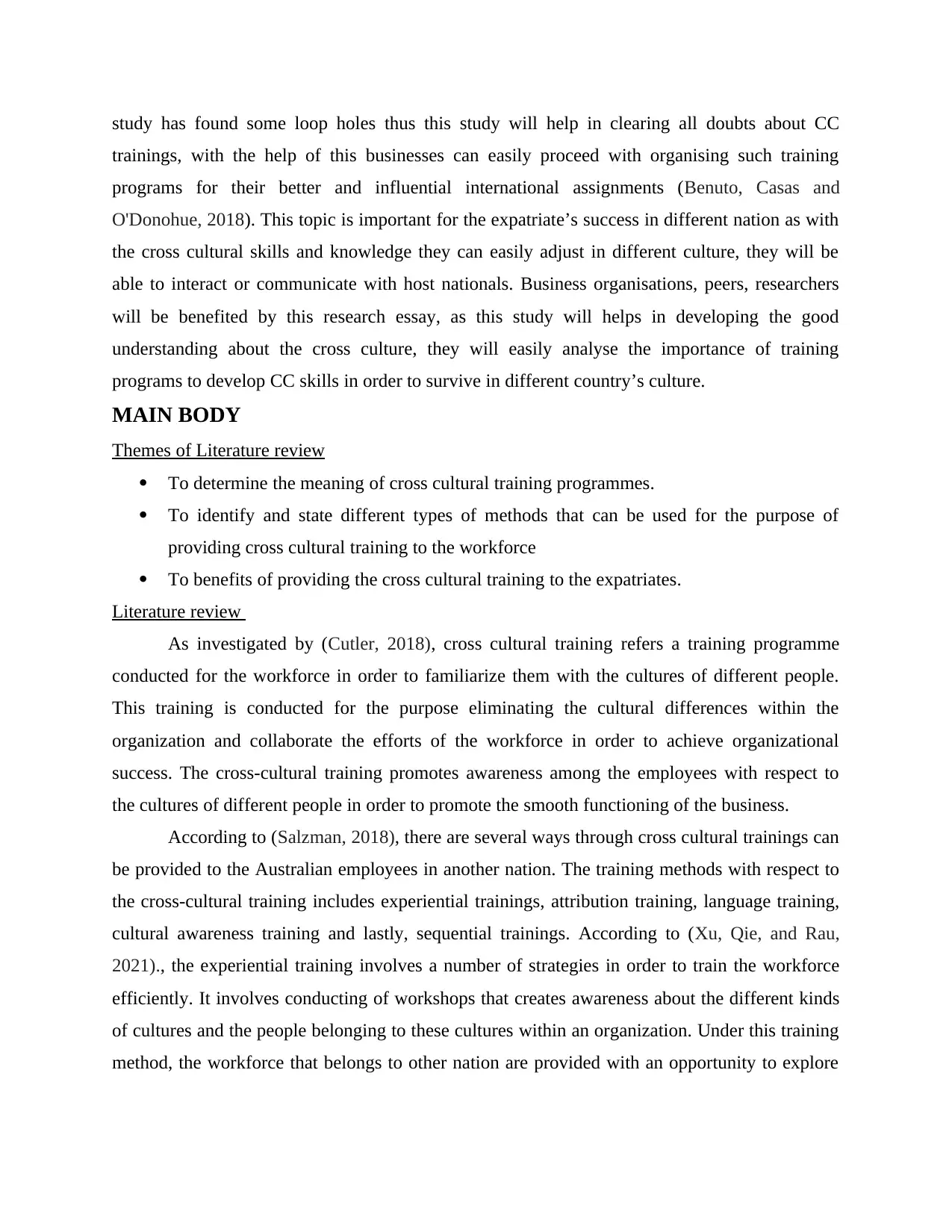
study has found some loop holes thus this study will help in clearing all doubts about CC
trainings, with the help of this businesses can easily proceed with organising such training
programs for their better and influential international assignments (Benuto, Casas and
O'Donohue, 2018). This topic is important for the expatriate’s success in different nation as with
the cross cultural skills and knowledge they can easily adjust in different culture, they will be
able to interact or communicate with host nationals. Business organisations, peers, researchers
will be benefited by this research essay, as this study will helps in developing the good
understanding about the cross culture, they will easily analyse the importance of training
programs to develop CC skills in order to survive in different country’s culture.
MAIN BODY
Themes of Literature review
To determine the meaning of cross cultural training programmes.
To identify and state different types of methods that can be used for the purpose of
providing cross cultural training to the workforce
To benefits of providing the cross cultural training to the expatriates.
Literature review
As investigated by (Cutler, 2018), cross cultural training refers a training programme
conducted for the workforce in order to familiarize them with the cultures of different people.
This training is conducted for the purpose eliminating the cultural differences within the
organization and collaborate the efforts of the workforce in order to achieve organizational
success. The cross-cultural training promotes awareness among the employees with respect to
the cultures of different people in order to promote the smooth functioning of the business.
According to (Salzman, 2018), there are several ways through cross cultural trainings can
be provided to the Australian employees in another nation. The training methods with respect to
the cross-cultural training includes experiential trainings, attribution training, language training,
cultural awareness training and lastly, sequential trainings. According to (Xu, Qie, and Rau,
2021)., the experiential training involves a number of strategies in order to train the workforce
efficiently. It involves conducting of workshops that creates awareness about the different kinds
of cultures and the people belonging to these cultures within an organization. Under this training
method, the workforce that belongs to other nation are provided with an opportunity to explore
trainings, with the help of this businesses can easily proceed with organising such training
programs for their better and influential international assignments (Benuto, Casas and
O'Donohue, 2018). This topic is important for the expatriate’s success in different nation as with
the cross cultural skills and knowledge they can easily adjust in different culture, they will be
able to interact or communicate with host nationals. Business organisations, peers, researchers
will be benefited by this research essay, as this study will helps in developing the good
understanding about the cross culture, they will easily analyse the importance of training
programs to develop CC skills in order to survive in different country’s culture.
MAIN BODY
Themes of Literature review
To determine the meaning of cross cultural training programmes.
To identify and state different types of methods that can be used for the purpose of
providing cross cultural training to the workforce
To benefits of providing the cross cultural training to the expatriates.
Literature review
As investigated by (Cutler, 2018), cross cultural training refers a training programme
conducted for the workforce in order to familiarize them with the cultures of different people.
This training is conducted for the purpose eliminating the cultural differences within the
organization and collaborate the efforts of the workforce in order to achieve organizational
success. The cross-cultural training promotes awareness among the employees with respect to
the cultures of different people in order to promote the smooth functioning of the business.
According to (Salzman, 2018), there are several ways through cross cultural trainings can
be provided to the Australian employees in another nation. The training methods with respect to
the cross-cultural training includes experiential trainings, attribution training, language training,
cultural awareness training and lastly, sequential trainings. According to (Xu, Qie, and Rau,
2021)., the experiential training involves a number of strategies in order to train the workforce
efficiently. It involves conducting of workshops that creates awareness about the different kinds
of cultures and the people belonging to these cultures within an organization. Under this training
method, the workforce that belongs to other nation are provided with an opportunity to explore
Paraphrase This Document
Need a fresh take? Get an instant paraphrase of this document with our AI Paraphraser
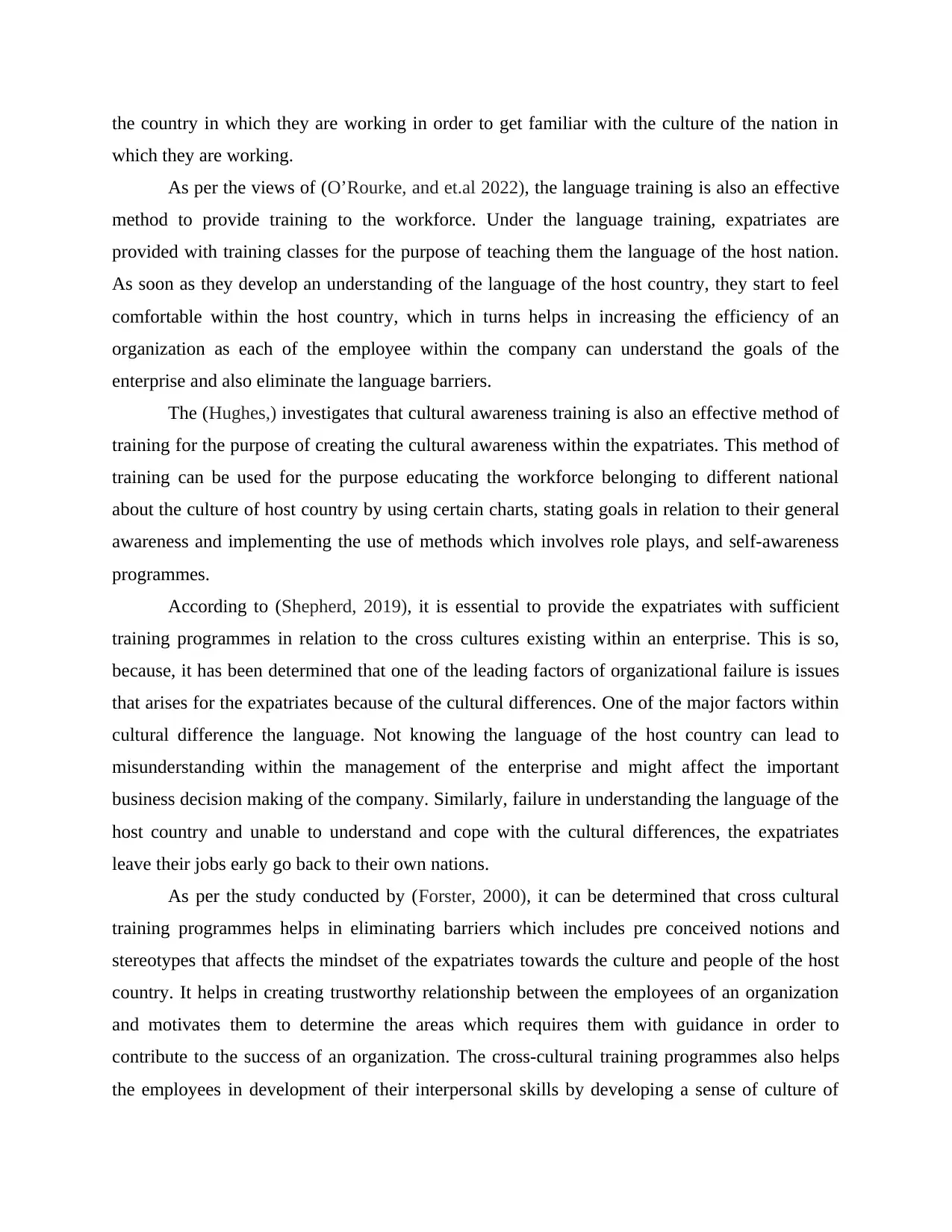
the country in which they are working in order to get familiar with the culture of the nation in
which they are working.
As per the views of (O’Rourke, and et.al 2022), the language training is also an effective
method to provide training to the workforce. Under the language training, expatriates are
provided with training classes for the purpose of teaching them the language of the host nation.
As soon as they develop an understanding of the language of the host country, they start to feel
comfortable within the host country, which in turns helps in increasing the efficiency of an
organization as each of the employee within the company can understand the goals of the
enterprise and also eliminate the language barriers.
The (Hughes,) investigates that cultural awareness training is also an effective method of
training for the purpose of creating the cultural awareness within the expatriates. This method of
training can be used for the purpose educating the workforce belonging to different national
about the culture of host country by using certain charts, stating goals in relation to their general
awareness and implementing the use of methods which involves role plays, and self-awareness
programmes.
According to (Shepherd, 2019), it is essential to provide the expatriates with sufficient
training programmes in relation to the cross cultures existing within an enterprise. This is so,
because, it has been determined that one of the leading factors of organizational failure is issues
that arises for the expatriates because of the cultural differences. One of the major factors within
cultural difference the language. Not knowing the language of the host country can lead to
misunderstanding within the management of the enterprise and might affect the important
business decision making of the company. Similarly, failure in understanding the language of the
host country and unable to understand and cope with the cultural differences, the expatriates
leave their jobs early go back to their own nations.
As per the study conducted by (Forster, 2000), it can be determined that cross cultural
training programmes helps in eliminating barriers which includes pre conceived notions and
stereotypes that affects the mindset of the expatriates towards the culture and people of the host
country. It helps in creating trustworthy relationship between the employees of an organization
and motivates them to determine the areas which requires them with guidance in order to
contribute to the success of an organization. The cross-cultural training programmes also helps
the employees in development of their interpersonal skills by developing a sense of culture of
which they are working.
As per the views of (O’Rourke, and et.al 2022), the language training is also an effective
method to provide training to the workforce. Under the language training, expatriates are
provided with training classes for the purpose of teaching them the language of the host nation.
As soon as they develop an understanding of the language of the host country, they start to feel
comfortable within the host country, which in turns helps in increasing the efficiency of an
organization as each of the employee within the company can understand the goals of the
enterprise and also eliminate the language barriers.
The (Hughes,) investigates that cultural awareness training is also an effective method of
training for the purpose of creating the cultural awareness within the expatriates. This method of
training can be used for the purpose educating the workforce belonging to different national
about the culture of host country by using certain charts, stating goals in relation to their general
awareness and implementing the use of methods which involves role plays, and self-awareness
programmes.
According to (Shepherd, 2019), it is essential to provide the expatriates with sufficient
training programmes in relation to the cross cultures existing within an enterprise. This is so,
because, it has been determined that one of the leading factors of organizational failure is issues
that arises for the expatriates because of the cultural differences. One of the major factors within
cultural difference the language. Not knowing the language of the host country can lead to
misunderstanding within the management of the enterprise and might affect the important
business decision making of the company. Similarly, failure in understanding the language of the
host country and unable to understand and cope with the cultural differences, the expatriates
leave their jobs early go back to their own nations.
As per the study conducted by (Forster, 2000), it can be determined that cross cultural
training programmes helps in eliminating barriers which includes pre conceived notions and
stereotypes that affects the mindset of the expatriates towards the culture and people of the host
country. It helps in creating trustworthy relationship between the employees of an organization
and motivates them to determine the areas which requires them with guidance in order to
contribute to the success of an organization. The cross-cultural training programmes also helps
the employees in development of their interpersonal skills by developing a sense of culture of
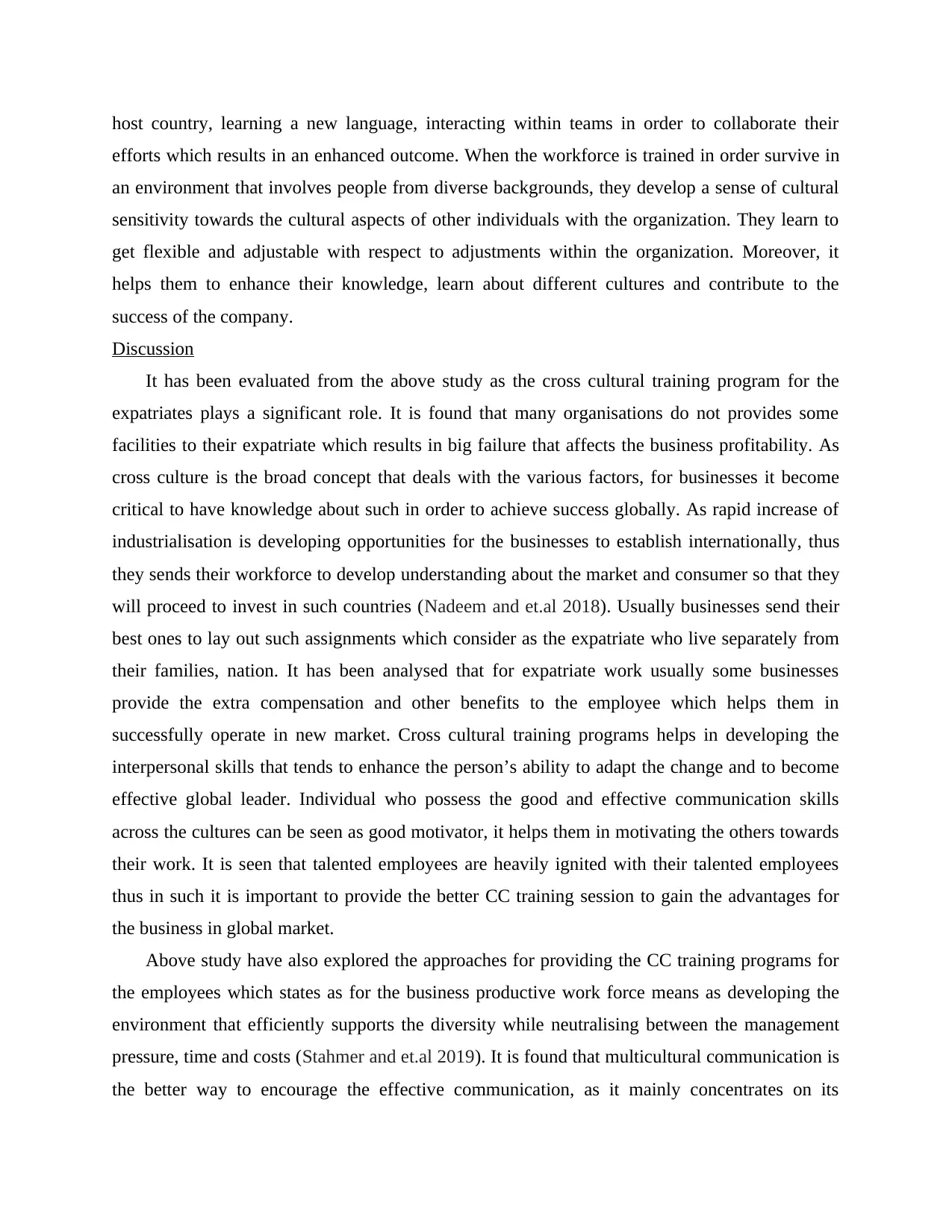
host country, learning a new language, interacting within teams in order to collaborate their
efforts which results in an enhanced outcome. When the workforce is trained in order survive in
an environment that involves people from diverse backgrounds, they develop a sense of cultural
sensitivity towards the cultural aspects of other individuals with the organization. They learn to
get flexible and adjustable with respect to adjustments within the organization. Moreover, it
helps them to enhance their knowledge, learn about different cultures and contribute to the
success of the company.
Discussion
It has been evaluated from the above study as the cross cultural training program for the
expatriates plays a significant role. It is found that many organisations do not provides some
facilities to their expatriate which results in big failure that affects the business profitability. As
cross culture is the broad concept that deals with the various factors, for businesses it become
critical to have knowledge about such in order to achieve success globally. As rapid increase of
industrialisation is developing opportunities for the businesses to establish internationally, thus
they sends their workforce to develop understanding about the market and consumer so that they
will proceed to invest in such countries (Nadeem and et.al 2018). Usually businesses send their
best ones to lay out such assignments which consider as the expatriate who live separately from
their families, nation. It has been analysed that for expatriate work usually some businesses
provide the extra compensation and other benefits to the employee which helps them in
successfully operate in new market. Cross cultural training programs helps in developing the
interpersonal skills that tends to enhance the person’s ability to adapt the change and to become
effective global leader. Individual who possess the good and effective communication skills
across the cultures can be seen as good motivator, it helps them in motivating the others towards
their work. It is seen that talented employees are heavily ignited with their talented employees
thus in such it is important to provide the better CC training session to gain the advantages for
the business in global market.
Above study have also explored the approaches for providing the CC training programs for
the employees which states as for the business productive work force means as developing the
environment that efficiently supports the diversity while neutralising between the management
pressure, time and costs (Stahmer and et.al 2019). It is found that multicultural communication is
the better way to encourage the effective communication, as it mainly concentrates on its
efforts which results in an enhanced outcome. When the workforce is trained in order survive in
an environment that involves people from diverse backgrounds, they develop a sense of cultural
sensitivity towards the cultural aspects of other individuals with the organization. They learn to
get flexible and adjustable with respect to adjustments within the organization. Moreover, it
helps them to enhance their knowledge, learn about different cultures and contribute to the
success of the company.
Discussion
It has been evaluated from the above study as the cross cultural training program for the
expatriates plays a significant role. It is found that many organisations do not provides some
facilities to their expatriate which results in big failure that affects the business profitability. As
cross culture is the broad concept that deals with the various factors, for businesses it become
critical to have knowledge about such in order to achieve success globally. As rapid increase of
industrialisation is developing opportunities for the businesses to establish internationally, thus
they sends their workforce to develop understanding about the market and consumer so that they
will proceed to invest in such countries (Nadeem and et.al 2018). Usually businesses send their
best ones to lay out such assignments which consider as the expatriate who live separately from
their families, nation. It has been analysed that for expatriate work usually some businesses
provide the extra compensation and other benefits to the employee which helps them in
successfully operate in new market. Cross cultural training programs helps in developing the
interpersonal skills that tends to enhance the person’s ability to adapt the change and to become
effective global leader. Individual who possess the good and effective communication skills
across the cultures can be seen as good motivator, it helps them in motivating the others towards
their work. It is seen that talented employees are heavily ignited with their talented employees
thus in such it is important to provide the better CC training session to gain the advantages for
the business in global market.
Above study have also explored the approaches for providing the CC training programs for
the employees which states as for the business productive work force means as developing the
environment that efficiently supports the diversity while neutralising between the management
pressure, time and costs (Stahmer and et.al 2019). It is found that multicultural communication is
the better way to encourage the effective communication, as it mainly concentrates on its
⊘ This is a preview!⊘
Do you want full access?
Subscribe today to unlock all pages.

Trusted by 1+ million students worldwide
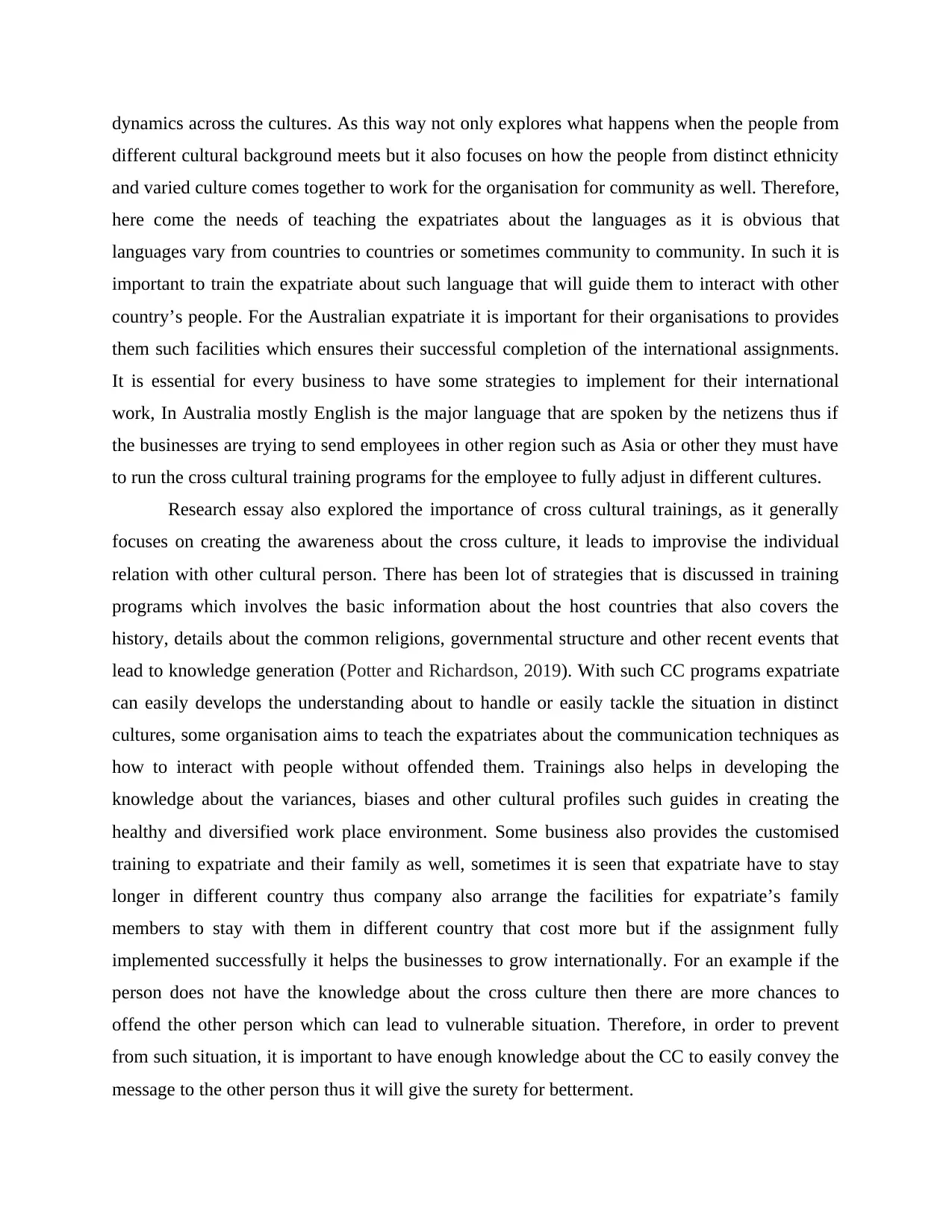
dynamics across the cultures. As this way not only explores what happens when the people from
different cultural background meets but it also focuses on how the people from distinct ethnicity
and varied culture comes together to work for the organisation for community as well. Therefore,
here come the needs of teaching the expatriates about the languages as it is obvious that
languages vary from countries to countries or sometimes community to community. In such it is
important to train the expatriate about such language that will guide them to interact with other
country’s people. For the Australian expatriate it is important for their organisations to provides
them such facilities which ensures their successful completion of the international assignments.
It is essential for every business to have some strategies to implement for their international
work, In Australia mostly English is the major language that are spoken by the netizens thus if
the businesses are trying to send employees in other region such as Asia or other they must have
to run the cross cultural training programs for the employee to fully adjust in different cultures.
Research essay also explored the importance of cross cultural trainings, as it generally
focuses on creating the awareness about the cross culture, it leads to improvise the individual
relation with other cultural person. There has been lot of strategies that is discussed in training
programs which involves the basic information about the host countries that also covers the
history, details about the common religions, governmental structure and other recent events that
lead to knowledge generation (Potter and Richardson, 2019). With such CC programs expatriate
can easily develops the understanding about to handle or easily tackle the situation in distinct
cultures, some organisation aims to teach the expatriates about the communication techniques as
how to interact with people without offended them. Trainings also helps in developing the
knowledge about the variances, biases and other cultural profiles such guides in creating the
healthy and diversified work place environment. Some business also provides the customised
training to expatriate and their family as well, sometimes it is seen that expatriate have to stay
longer in different country thus company also arrange the facilities for expatriate’s family
members to stay with them in different country that cost more but if the assignment fully
implemented successfully it helps the businesses to grow internationally. For an example if the
person does not have the knowledge about the cross culture then there are more chances to
offend the other person which can lead to vulnerable situation. Therefore, in order to prevent
from such situation, it is important to have enough knowledge about the CC to easily convey the
message to the other person thus it will give the surety for betterment.
different cultural background meets but it also focuses on how the people from distinct ethnicity
and varied culture comes together to work for the organisation for community as well. Therefore,
here come the needs of teaching the expatriates about the languages as it is obvious that
languages vary from countries to countries or sometimes community to community. In such it is
important to train the expatriate about such language that will guide them to interact with other
country’s people. For the Australian expatriate it is important for their organisations to provides
them such facilities which ensures their successful completion of the international assignments.
It is essential for every business to have some strategies to implement for their international
work, In Australia mostly English is the major language that are spoken by the netizens thus if
the businesses are trying to send employees in other region such as Asia or other they must have
to run the cross cultural training programs for the employee to fully adjust in different cultures.
Research essay also explored the importance of cross cultural trainings, as it generally
focuses on creating the awareness about the cross culture, it leads to improvise the individual
relation with other cultural person. There has been lot of strategies that is discussed in training
programs which involves the basic information about the host countries that also covers the
history, details about the common religions, governmental structure and other recent events that
lead to knowledge generation (Potter and Richardson, 2019). With such CC programs expatriate
can easily develops the understanding about to handle or easily tackle the situation in distinct
cultures, some organisation aims to teach the expatriates about the communication techniques as
how to interact with people without offended them. Trainings also helps in developing the
knowledge about the variances, biases and other cultural profiles such guides in creating the
healthy and diversified work place environment. Some business also provides the customised
training to expatriate and their family as well, sometimes it is seen that expatriate have to stay
longer in different country thus company also arrange the facilities for expatriate’s family
members to stay with them in different country that cost more but if the assignment fully
implemented successfully it helps the businesses to grow internationally. For an example if the
person does not have the knowledge about the cross culture then there are more chances to
offend the other person which can lead to vulnerable situation. Therefore, in order to prevent
from such situation, it is important to have enough knowledge about the CC to easily convey the
message to the other person thus it will give the surety for betterment.
Paraphrase This Document
Need a fresh take? Get an instant paraphrase of this document with our AI Paraphraser
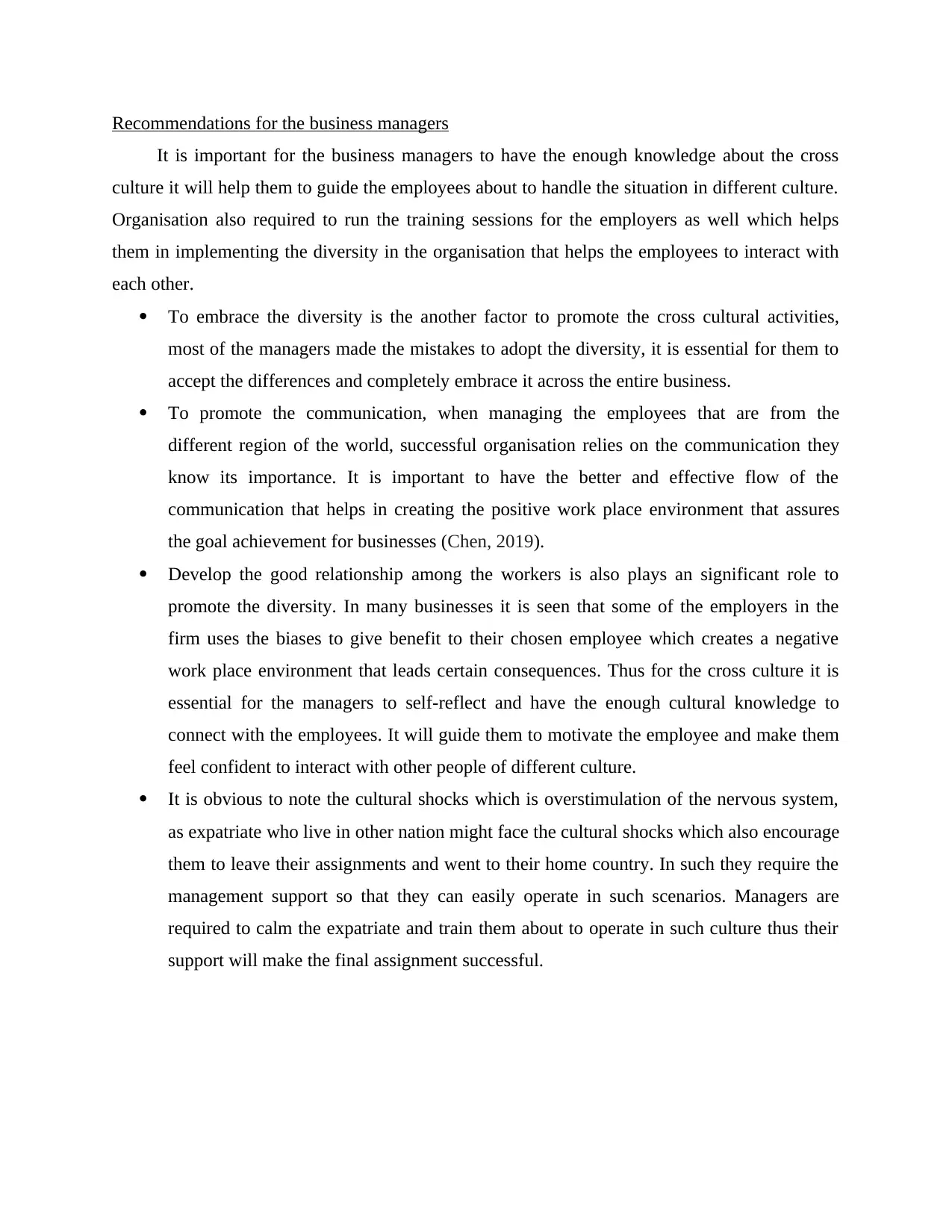
Recommendations for the business managers
It is important for the business managers to have the enough knowledge about the cross
culture it will help them to guide the employees about to handle the situation in different culture.
Organisation also required to run the training sessions for the employers as well which helps
them in implementing the diversity in the organisation that helps the employees to interact with
each other.
To embrace the diversity is the another factor to promote the cross cultural activities,
most of the managers made the mistakes to adopt the diversity, it is essential for them to
accept the differences and completely embrace it across the entire business.
To promote the communication, when managing the employees that are from the
different region of the world, successful organisation relies on the communication they
know its importance. It is important to have the better and effective flow of the
communication that helps in creating the positive work place environment that assures
the goal achievement for businesses (Chen, 2019).
Develop the good relationship among the workers is also plays an significant role to
promote the diversity. In many businesses it is seen that some of the employers in the
firm uses the biases to give benefit to their chosen employee which creates a negative
work place environment that leads certain consequences. Thus for the cross culture it is
essential for the managers to self-reflect and have the enough cultural knowledge to
connect with the employees. It will guide them to motivate the employee and make them
feel confident to interact with other people of different culture.
It is obvious to note the cultural shocks which is overstimulation of the nervous system,
as expatriate who live in other nation might face the cultural shocks which also encourage
them to leave their assignments and went to their home country. In such they require the
management support so that they can easily operate in such scenarios. Managers are
required to calm the expatriate and train them about to operate in such culture thus their
support will make the final assignment successful.
It is important for the business managers to have the enough knowledge about the cross
culture it will help them to guide the employees about to handle the situation in different culture.
Organisation also required to run the training sessions for the employers as well which helps
them in implementing the diversity in the organisation that helps the employees to interact with
each other.
To embrace the diversity is the another factor to promote the cross cultural activities,
most of the managers made the mistakes to adopt the diversity, it is essential for them to
accept the differences and completely embrace it across the entire business.
To promote the communication, when managing the employees that are from the
different region of the world, successful organisation relies on the communication they
know its importance. It is important to have the better and effective flow of the
communication that helps in creating the positive work place environment that assures
the goal achievement for businesses (Chen, 2019).
Develop the good relationship among the workers is also plays an significant role to
promote the diversity. In many businesses it is seen that some of the employers in the
firm uses the biases to give benefit to their chosen employee which creates a negative
work place environment that leads certain consequences. Thus for the cross culture it is
essential for the managers to self-reflect and have the enough cultural knowledge to
connect with the employees. It will guide them to motivate the employee and make them
feel confident to interact with other people of different culture.
It is obvious to note the cultural shocks which is overstimulation of the nervous system,
as expatriate who live in other nation might face the cultural shocks which also encourage
them to leave their assignments and went to their home country. In such they require the
management support so that they can easily operate in such scenarios. Managers are
required to calm the expatriate and train them about to operate in such culture thus their
support will make the final assignment successful.
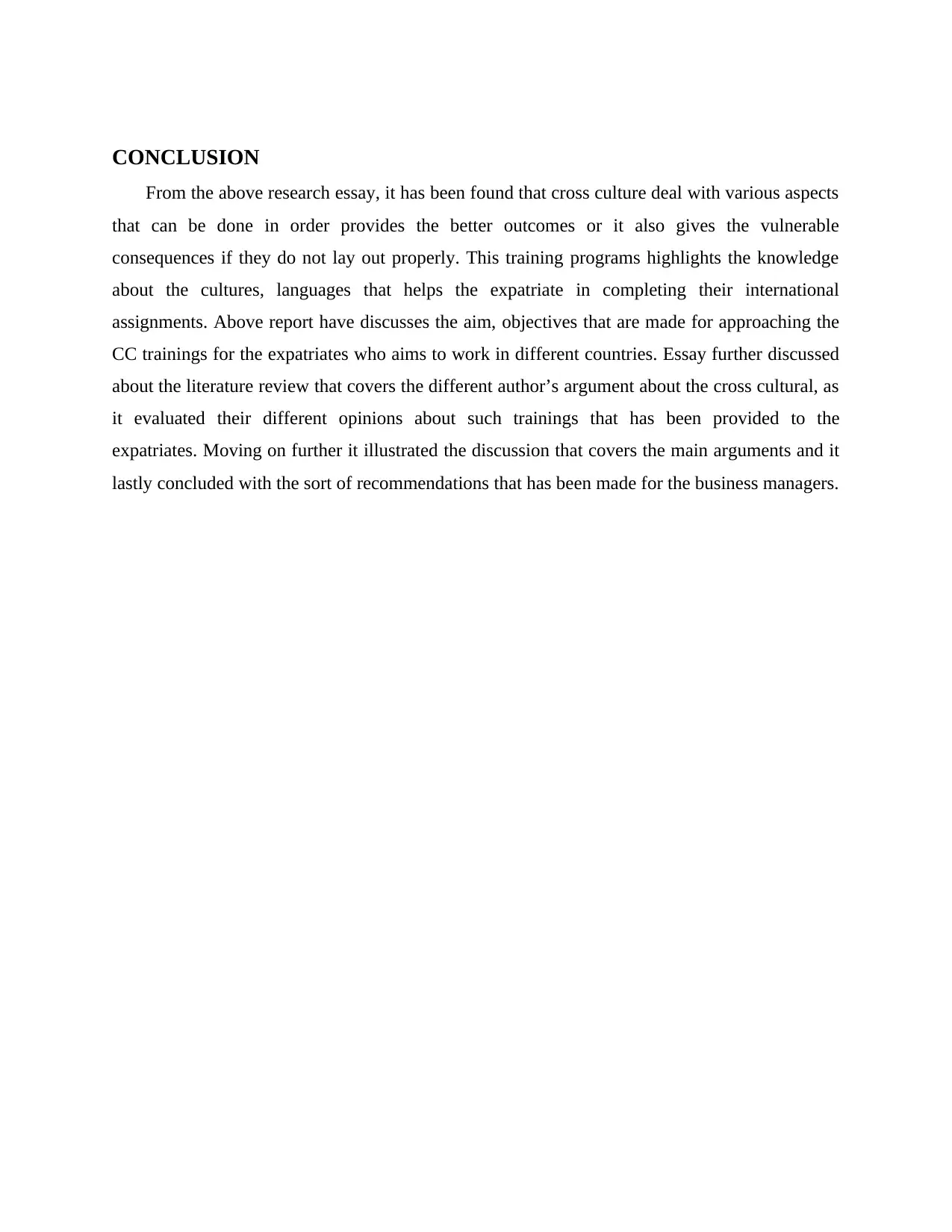
CONCLUSION
From the above research essay, it has been found that cross culture deal with various aspects
that can be done in order provides the better outcomes or it also gives the vulnerable
consequences if they do not lay out properly. This training programs highlights the knowledge
about the cultures, languages that helps the expatriate in completing their international
assignments. Above report have discusses the aim, objectives that are made for approaching the
CC trainings for the expatriates who aims to work in different countries. Essay further discussed
about the literature review that covers the different author’s argument about the cross cultural, as
it evaluated their different opinions about such trainings that has been provided to the
expatriates. Moving on further it illustrated the discussion that covers the main arguments and it
lastly concluded with the sort of recommendations that has been made for the business managers.
From the above research essay, it has been found that cross culture deal with various aspects
that can be done in order provides the better outcomes or it also gives the vulnerable
consequences if they do not lay out properly. This training programs highlights the knowledge
about the cultures, languages that helps the expatriate in completing their international
assignments. Above report have discusses the aim, objectives that are made for approaching the
CC trainings for the expatriates who aims to work in different countries. Essay further discussed
about the literature review that covers the different author’s argument about the cross cultural, as
it evaluated their different opinions about such trainings that has been provided to the
expatriates. Moving on further it illustrated the discussion that covers the main arguments and it
lastly concluded with the sort of recommendations that has been made for the business managers.
⊘ This is a preview!⊘
Do you want full access?
Subscribe today to unlock all pages.

Trusted by 1+ million students worldwide
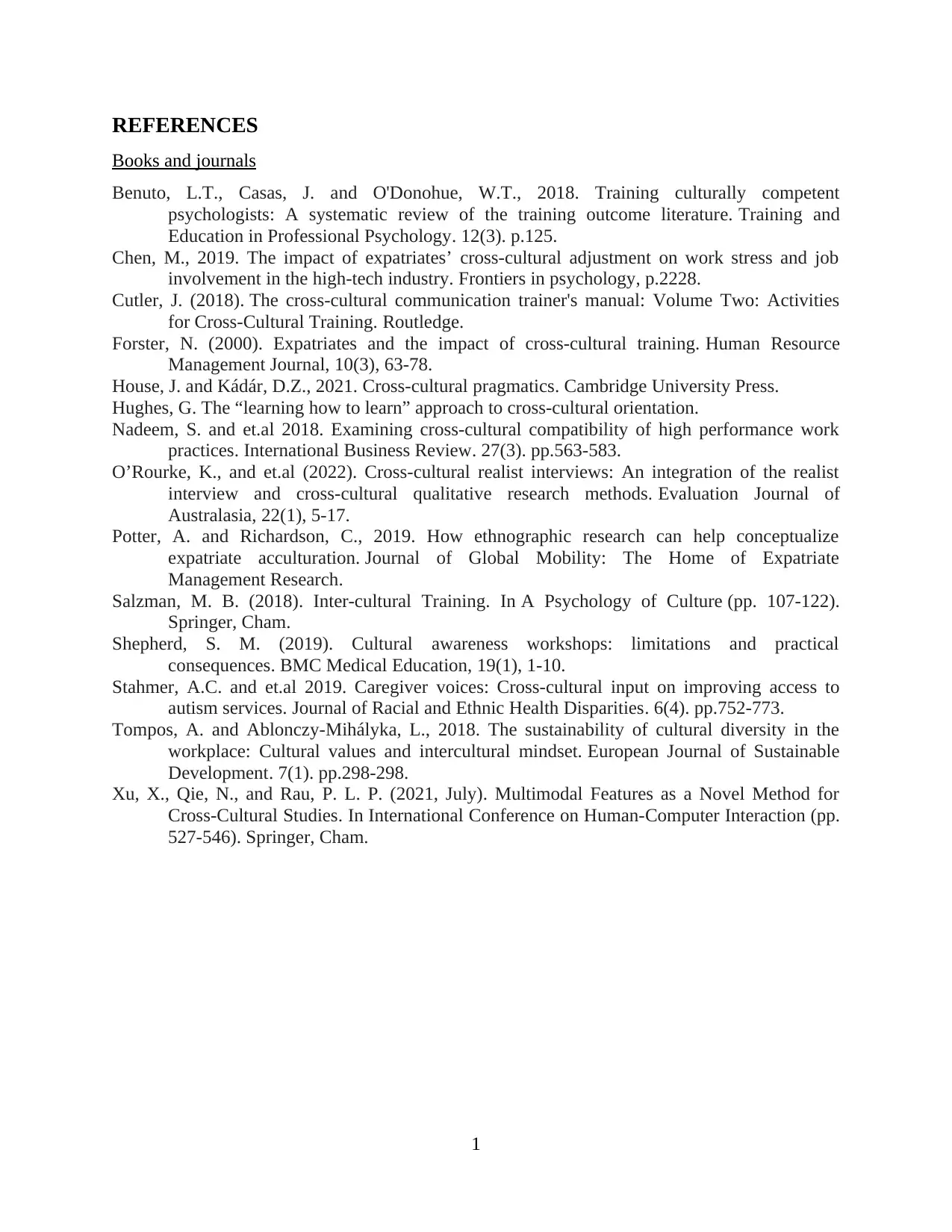
REFERENCES
Books and journals
Benuto, L.T., Casas, J. and O'Donohue, W.T., 2018. Training culturally competent
psychologists: A systematic review of the training outcome literature. Training and
Education in Professional Psychology. 12(3). p.125.
Chen, M., 2019. The impact of expatriates’ cross-cultural adjustment on work stress and job
involvement in the high-tech industry. Frontiers in psychology, p.2228.
Cutler, J. (2018). The cross-cultural communication trainer's manual: Volume Two: Activities
for Cross-Cultural Training. Routledge.
Forster, N. (2000). Expatriates and the impact of cross‐cultural training. Human Resource
Management Journal, 10(3), 63-78.
House, J. and Kádár, D.Z., 2021. Cross-cultural pragmatics. Cambridge University Press.
Hughes, G. The “learning how to learn” approach to cross-cultural orientation.
Nadeem, S. and et.al 2018. Examining cross-cultural compatibility of high performance work
practices. International Business Review. 27(3). pp.563-583.
O’Rourke, K., and et.al (2022). Cross-cultural realist interviews: An integration of the realist
interview and cross-cultural qualitative research methods. Evaluation Journal of
Australasia, 22(1), 5-17.
Potter, A. and Richardson, C., 2019. How ethnographic research can help conceptualize
expatriate acculturation. Journal of Global Mobility: The Home of Expatriate
Management Research.
Salzman, M. B. (2018). Inter-cultural Training. In A Psychology of Culture (pp. 107-122).
Springer, Cham.
Shepherd, S. M. (2019). Cultural awareness workshops: limitations and practical
consequences. BMC Medical Education, 19(1), 1-10.
Stahmer, A.C. and et.al 2019. Caregiver voices: Cross-cultural input on improving access to
autism services. Journal of Racial and Ethnic Health Disparities. 6(4). pp.752-773.
Tompos, A. and Ablonczy-Mihályka, L., 2018. The sustainability of cultural diversity in the
workplace: Cultural values and intercultural mindset. European Journal of Sustainable
Development. 7(1). pp.298-298.
Xu, X., Qie, N., and Rau, P. L. P. (2021, July). Multimodal Features as a Novel Method for
Cross-Cultural Studies. In International Conference on Human-Computer Interaction (pp.
527-546). Springer, Cham.
1
Books and journals
Benuto, L.T., Casas, J. and O'Donohue, W.T., 2018. Training culturally competent
psychologists: A systematic review of the training outcome literature. Training and
Education in Professional Psychology. 12(3). p.125.
Chen, M., 2019. The impact of expatriates’ cross-cultural adjustment on work stress and job
involvement in the high-tech industry. Frontiers in psychology, p.2228.
Cutler, J. (2018). The cross-cultural communication trainer's manual: Volume Two: Activities
for Cross-Cultural Training. Routledge.
Forster, N. (2000). Expatriates and the impact of cross‐cultural training. Human Resource
Management Journal, 10(3), 63-78.
House, J. and Kádár, D.Z., 2021. Cross-cultural pragmatics. Cambridge University Press.
Hughes, G. The “learning how to learn” approach to cross-cultural orientation.
Nadeem, S. and et.al 2018. Examining cross-cultural compatibility of high performance work
practices. International Business Review. 27(3). pp.563-583.
O’Rourke, K., and et.al (2022). Cross-cultural realist interviews: An integration of the realist
interview and cross-cultural qualitative research methods. Evaluation Journal of
Australasia, 22(1), 5-17.
Potter, A. and Richardson, C., 2019. How ethnographic research can help conceptualize
expatriate acculturation. Journal of Global Mobility: The Home of Expatriate
Management Research.
Salzman, M. B. (2018). Inter-cultural Training. In A Psychology of Culture (pp. 107-122).
Springer, Cham.
Shepherd, S. M. (2019). Cultural awareness workshops: limitations and practical
consequences. BMC Medical Education, 19(1), 1-10.
Stahmer, A.C. and et.al 2019. Caregiver voices: Cross-cultural input on improving access to
autism services. Journal of Racial and Ethnic Health Disparities. 6(4). pp.752-773.
Tompos, A. and Ablonczy-Mihályka, L., 2018. The sustainability of cultural diversity in the
workplace: Cultural values and intercultural mindset. European Journal of Sustainable
Development. 7(1). pp.298-298.
Xu, X., Qie, N., and Rau, P. L. P. (2021, July). Multimodal Features as a Novel Method for
Cross-Cultural Studies. In International Conference on Human-Computer Interaction (pp.
527-546). Springer, Cham.
1
1 out of 10
Related Documents
Your All-in-One AI-Powered Toolkit for Academic Success.
+13062052269
info@desklib.com
Available 24*7 on WhatsApp / Email
![[object Object]](/_next/static/media/star-bottom.7253800d.svg)
Unlock your academic potential
Copyright © 2020–2026 A2Z Services. All Rights Reserved. Developed and managed by ZUCOL.





